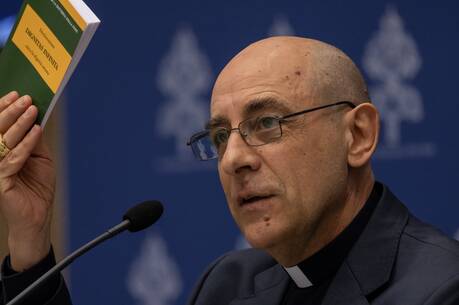Earlier this semester, I said to a student, as I shook his hand after Sunday Mass, “Did anyone ever tell you that you look a lot like...
“Harry Potter?” He interrupted me. “All the time!”
“You really do!”
A few weeks later, at Halloween, many students had donned costumes for class. Harry’s look-a-like passed me in the student dining hall. He was carrying a stick, clearly meant to be a wand. Reaching my table, he pulled back his bangs and said excitedly, “Look, the scar!” On his forehead, he had penciled in a lightning bolt.
I used to tell students that they shouldn’t tackle theology—at least not with me—until they’d mastered Star Trek, but times change. Here’s the passage in The Sorcerer’s Stone that introduces Harry’s scar.
Dumbledore and Professor McGonagall bent forward over the bundle of blankets. Inside, just visible, was a baby boy, fast asleep. Under the tuft of jet-black hair over his forehead they could see a curiously shaped cut, like a bolt of lightning.
“Is that where—?” whispered Professor McGonagall.
“Yes,” said Dumbledore. “He’ll have that scar forever.”
“Couldn’t you do something about it, Dumbledore?”
“Even if I could, I wouldn’t. Scars can come in handy. I have one myself above my left knee that is a perfect map of the London Underground.
Mentioning Harry Potter inflames those who worry that the great danger threatening our youth today is a temptation to practice witchcraft, but J. K. Rowling found something archetypal in Harry’s scar. It suggests something that most of us, and our ancestors, believe instinctively: what happens to us in this life is part of a larger struggle, one that precedes our story and yet plays itself out, even in the chapters of our lives.
Before Harry was Harry, which is to say, before he knew his destiny as the one who would battle and defeat Lord Voldemort, he had already been touched by the events that would define his life. Wounded as a infant, in the battle that took his parents’ lives, Harry’s scar was a visible sign of his destiny, a clue that his life was larger than he or others knew.
So often Catholics come at the Feast of the Immaculate Conception, expending their homiletical wattage in arguing how reasonable the feast is, perhaps trying to appease a Protestant consciousness, which probably gives the dogma little thought anyway: of course Mary still needed a savior; of course she still had a choice to make.
I’ve done my share of the same, but why not delight in the luster of the feast, shining as it does in the constellation of Christmas? In the destiny of the virgin, we are schooled to see that our lives have meaning, that God’s designs for us were set in place before the stars found a home.
Mary was “touched,” “marked” from the first moment of her existence. She was kept free from original sin, because there was never a moment of her life when she wasn’t a part of God’s plan, when her destiny wasn’t lovingly shielded in the warmth of his hand.
One could say that the Immaculate Conception tells us that Mary’s story was more than Mary’s story. It was God’s. For those of us who aren’t destined to play a major role in salvation history—who won’t be battling Lord Voldemort anytime soon—the great joy and consolation of the feast is knowing that even we have a role to play, a destiny writ into the very designs of God. As an infant, Harry was touched by evil; it still shows in his scar. Mary was touched by grace, and that mark still shines in her countenance.
Terrance W. Klein








http://www.huffingtonpost.com/fr-rick-malloy-sj-/harry-potter-good-for-eve_b_56968.html